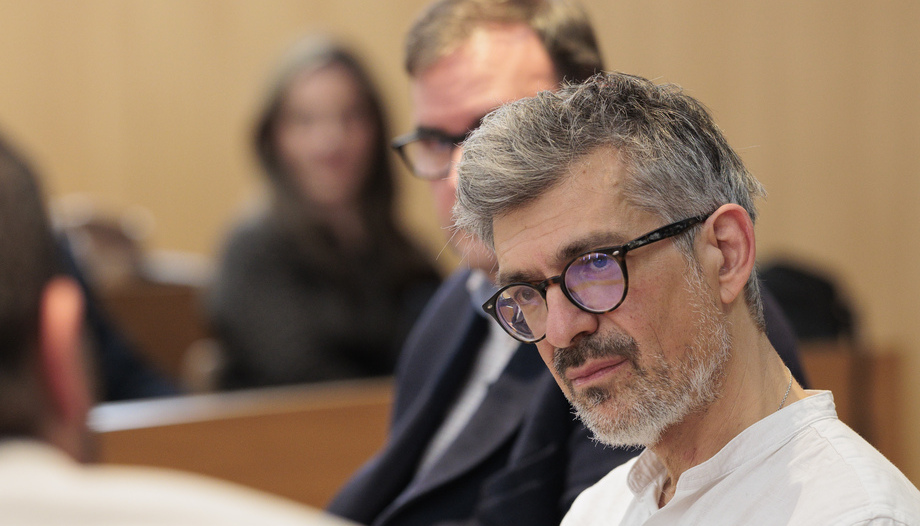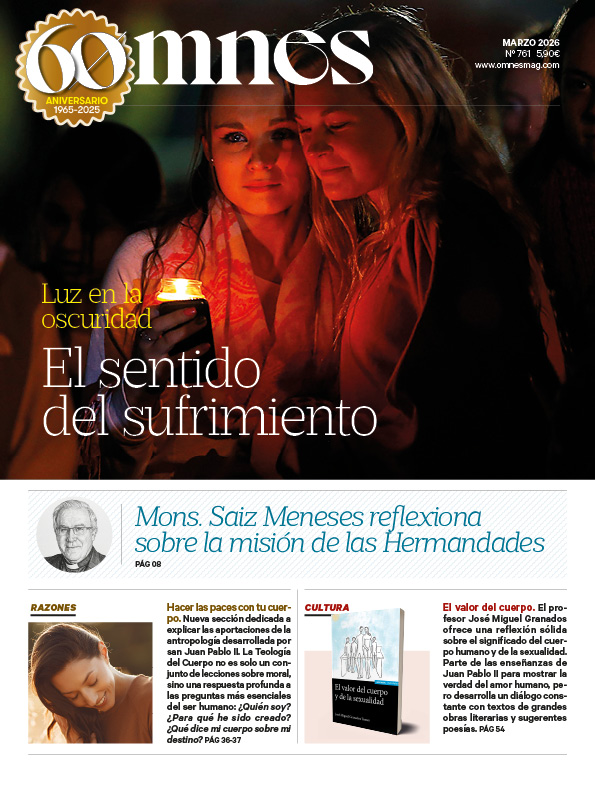Fabrice Hadjadj is a French philosopher and author known for works such as "The Luck of Being Born in Our Time", "The Faith of Demons (or Atheism Overcome)" or "Why Give Life to a Mortal: and Other Lessons".
For several years he has been living in Fribourg (Switzerland), where he directs the Philanthropos Institute, an initiative that aims to give young people a solid foundation in philosophy, theology and manual work, all strongly inspired by the Benedictine mentality.
Now, Fabrice Hadjadj and his wife Siffreine Michel are moving to Spain to start a new business venture. INCARNATUS Instituteinspired by the Swiss project. Through INCARNATUS, Fabrice and his wife want to delve deeper into the Hispanic American culture and, from the humanitiesto help those who feel called to delve deeper into reality, far beyond what technology can offer.
The institute is still in full development, but Fabrice Hadjadj shares in this interview with Omnes the keys that make him think that the humanities are the answer to the questions we ask ourselves today, and the secret to achieving what we long for so much: freedom.
Why do you think that today more than ever it is urgent to rediscover the humanities, especially in the face of the advance of a technocratic and utilitarian vision of the human being?
- The word "humanities" already gives the answer, because to be interested in the humanities is to discover your humanity. Although when we talk about humanities we talk about reading texts by ancient authors and the question is: if we are men of today, why do we have to read ancient authors?
The reality is that to be free you have to distance yourself from your time. If we are immersed in our time, we are convinced that everything that is done in our time has always been done this way. When I read ancient authors, not only do I enter into a very deep human wisdom (deep because it has come to cross time), but I also take distance from my time and become free.
We often think that freedom comes from revolution, but freedom comes from tradition. When I read Plato or St. Augustine, I take distance from my time and I can criticize it. Even the French revolutionaries read the ancients and referred to the Roman Republic. Marxist revolutionaries, too, read Marx, and Marx read Aristotle. From Aristotle's texts Marx criticized capitalism.
The revolution, the good revolution, has to be understood in a relationship with tradition in order to find freedom and to tear ourselves away from our epoch to see it objectively.
How do you see the role of beauty in awakening the desire for truth and for a truly human life?
- When I talk about theater and singing, I am not only talking about beauty, but also about a practice. Many times people talk about beauty as a spectacle, but what interests me is to do things in beauty.
Beauty calls for beauty and what interests me is not the fact of loving poetry, but of becoming the poet of your own existence. So when I speak of singing and theater, it is to speak of a practice of beauty that enters our body and is carried in our veins and in our gestures.
In this bringing beauty in us there is a question of freedom. The problem of the modern world is to believe that we start being free and that we do not have to learn to be free. But, precisely when learning an art, especially a demanding art such as one linked to beauty, it is understood that freedom is a learning process.
If you want to play flamenco guitar, you have to learn, you can't do it all at once. You don't need to go to a school or an academic institution, but you need a teacher and a living tradition, which is not a reconstructed ideological tradition. This is what I see in theater and singing, not only the embodiment of beauty, but the development of freedom.
Are INCARNATUS and Philanthropos also projects for married people?
- The projects are aimed first at students, people who are rather unmarried and do not have a regular job. But engaged couples have been welcomed and this year for the first time there is a married couple who were willing to enter into this adventure and who do not have children. These are projects to create your own community, not so much to be in your community.
There will be times when people who already work on a daily basis will be able to participate. We have seen people transformed by seeing what we lived, that is what the word of Christ says: "Come and see". We are in a world in which there are so many words and signs sent in all directions, that the word "come and see" is very important for there to be a transformation.
What is the contemporary crisis of meaning? Why can God and philosophy respond to this crisis?
- We can take the word "sense" in its most elementary meaning. There is a crisis of sense and a crisis of sensation. In a digital world we do not know how to feel, we have lost the sense of touch and smell. We have ears to distinguish signals, but not to listen. Our eyes are wide open like mouths that would like to swallow images that destroy each other, so that we cannot even see.
That is why I insist on creating places where sensations can be recreated, through manual work, musical instruments or by being around a table where a conversation can be had.
The crisis of meaning is a crisis of feeling. It is really a crisis at the most basic level. Then there is another level, which is the crisis of hope, because meaning is also an orientation, a path towards.
Modernity was progressive and was persuaded that the world was going to be better. The meaning was not eternal but temporary and that meaning was "tomorrow there will be a better society". Today this progressive project of a better society has created threats that are worse than any that have ever weighed on humanity.
The world made better by consumption is destroying the world. Thus, modern hopes have collapsed and so, apart from having to find the base, we have to find the summit, which is a hope that comes from further away than the world itself: an eternal hope where things are not done because tomorrow will be better, but because God has asked us to keep and cultivate the garden.
Today, hope is no longer an option. As worldly hopes have collapsed, religious hope is not an option. Therefore, let us find both the body and the spirit at the same time, to get out of this limbo.







